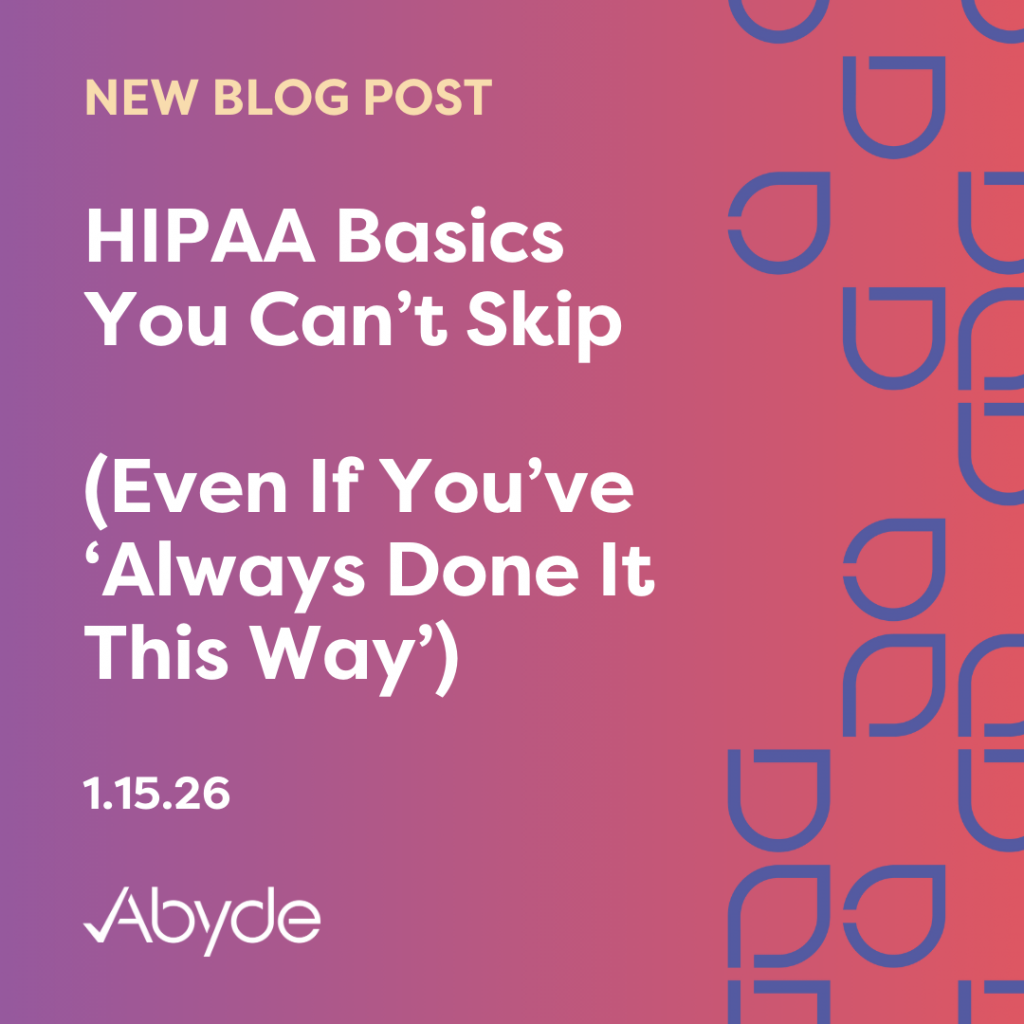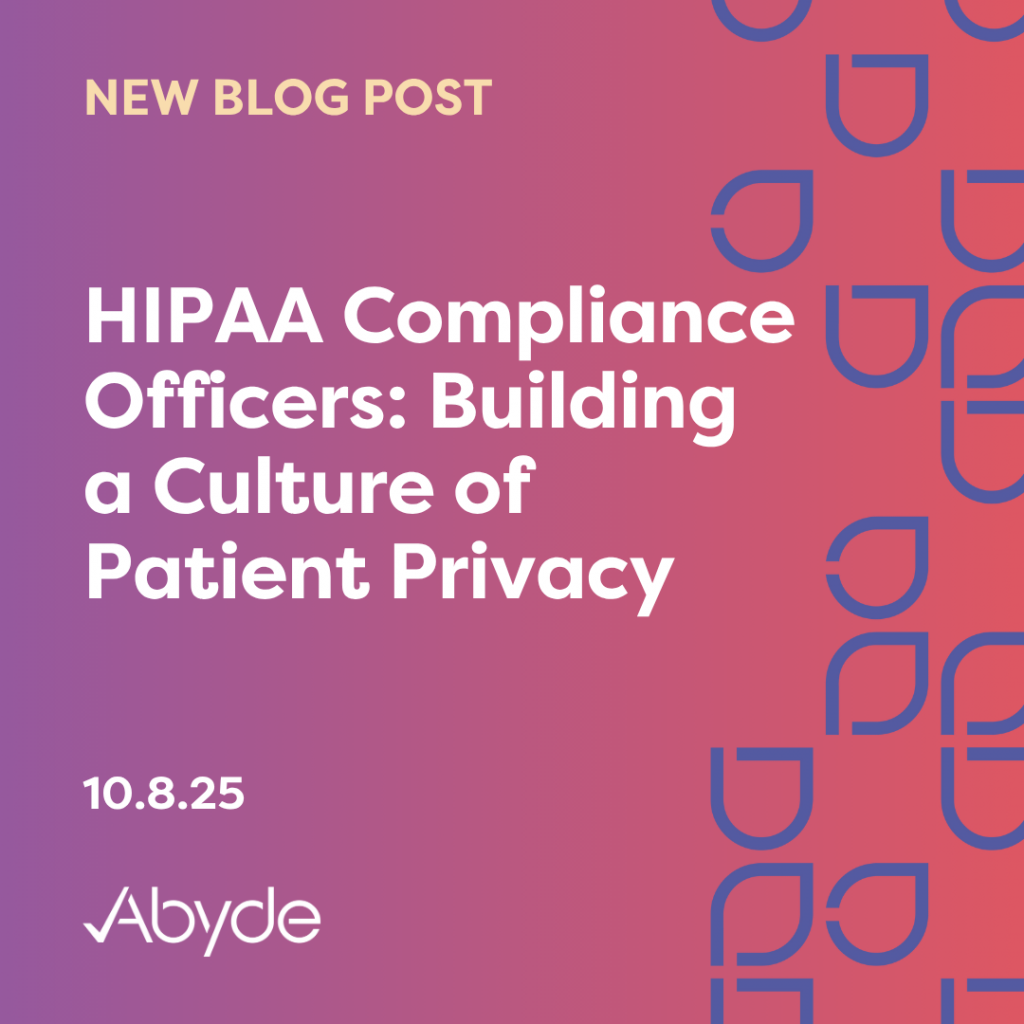January 15, 2026 As your practice shakes off the post-holiday haze, it’s time to go back to basics. Before picking up the pace, it’s worth slowing down to look at the foundations. While your practice might have routine procedures, it’s time to double-check if they’re even compliant. The Training Refresh Staff must complete HIPAA training when joining your practice, but that’s not all. HIPAA requires annual training and updates after policy changes or breaches, and whenever staff review is needed. Long story short, your practice needs a lot of training. When in doubt, provide staff training to ensure they are comfortable and confident in handling Protected Health Information (PHI). Titles Matter Even in a small practice, it’s required to assign a HIPAA Compliance Officer (HCO). We know that ‘wearing many hats’ is the reality of a small team, but designating a clear leader for compliance provides a vital anchor. It ensures your staff knows exactly who to turn to for guidance. If the OCR ever comes knocking, they require a single point of contact to streamline the investigation. Social Media Savviness We hate to break it to you, but your Gen Z receptionist could make your practice viral for all the wrong reasons. Social media can be beneficial for sharing your practice to a larger audience, but your staff needs to handle it very carefully. While it might be fun to partake in the latest TikTok trend, make sure that any PHI cannot be seen in the clips, and do not include a patient in any content unless there is explicit consent to do so. Having a media consent form is key in these situations. Keep it General Alongside social media, Google reviews can be a great way to show you’re listening, but HIPAA changes what you can say. Even if the review is favorable, you cannot identify whether the patient has been in your practice or not. Even if the review details a specific experience at your practice, it’s their choice to disclose this information, and your job, under HIPAA, is not to confirm it. For instance, a good public review would be: Thanks for the kind words! If you have additional feedback, please call us at xxx-xxx-xxxx. If you get a negative review, keep your response brief and offline. First, check for spam or rule violations and report if necessary. Otherwise, don’t clarify details or if they’re a patient. A good response: Thank you for your feedback. We’d like to learn more. Please contact us at xxx-xxx-xxxx. Practices can, and have been, fined for improper Google review responses, so your team must remain calm and neutral online. Lock it Down While it might feel easier for your practice to use a single, shared email to log in and access everything, it’s much safer (and wiser) for every team member to have their own login with role-based permissions. Individual accounts create accountability, keep information organized, and enable the implementation of role-based access. Not everyone in your practice needs access to the same information, and they shouldn’t have it. For example, your receptionist likely doesn’t need access to X-rays or clinical notes, but they do need access to scheduling software. When permissions align with the job, you reduce the risk of accidental exposure and keep sensitive data limited to those who genuinely need it. Individual logins make off-boarding easy. When someone leaves, remove their access immediately without disrupting the team or requiring a shared password change. This small shift greatly boosts compliance and protects patient information. Change Habits Today It’s easy to let compliance fall to the bottom of the to-do list when you’ve “always done it this way”. Thankfully, intelligent software can streamline these requirements for you. With the right platform, you can ensure training is handled correctly, that dynamic policies and procedures are properly formatted for your team, and that you have access to a team of compliance experts when navigating difficult compliance questions. Take the next step: schedule a compliance consultation with our team. We’ll show you exactly how to meet HIPAA requirements, simplify your processes, and protect your practice with confidence. Contact us today to get started.
HIPAA Compliance Officers: Building a Culture of Patient Privacy
October 8, 2025 What happens when a patient calls with a complaint about their medical records? Or when a Business Associate requests access to your data? If you’re unsure, it’s time to meet with your practice’s HIPAA Compliance Officer (HCO). HIPAA requires hiring a compliance officer (HCO), which is key to building a foundation of HIPAA compliance for your practice. More than just a box to check, having an HCO provides structure and clarity for your practice, ensuring that all the proper safeguards are in place to secure patient data. While the HCO title might seem like a simple administrative label, the duties are anything but. This vital oversight ensures that everyone knows their HIPAA responsibilities and that patients’ Protected Health Information (PHI) is kept under lock and key. Behind the Badge: Responsibilities of an HCO An HCO wears many hats when it comes to compliance. From safeguarding PHI to managing vendors, these responsibilities form the backbone of a practice’s HIPAA program. First, the HCO needs to complete a Security Risk Analysis (SRA) for the practice. The SRA is a thorough document detailing all physical, technical, and administrative safeguards to keep PHI safe. The HCO should update it annually, and new legislation has been proposed to define this as a yearly requirement strictly. An SRA can be completed by hiring a third-party consultant, leveraging smart software, or even manually entering the information. HCOs should consider time investment, accuracy, and cost before choosing an approach. The HCO must ensure that every staff member is adequately trained and aware of their responsibilities before interacting with PHI. This includes showing new staff where compliance documents (policies, procedures, forms, etc.) are and equipping staff with thorough training to handle any situation with PHI. Additionally, the HCO must ensure all training and documentation are current and in line with the latest legislation. HCOs must also ensure that any relationship with a vendor is handled correctly and there’s documentation to prove it. The vendors, or Business Associates (BAs), that work alongside healthcare providers and have access to PHI must also be HIPAA compliant. One of the most important documents when working with a BA is the Business Associate Agreement (BAA). This required agreement holds both parties liable and defines their responsibilities. Both BAs and Covered Entities must sign this document before working together. The Office for Civil Rights (OCR) can and has fined practices for missing a BAA after a breach. This is only a brief overview of the many responsibilities HCOs take on. A good HCO establishes a culture of compliance, ensuring that protecting patient information becomes second nature for the entire practice. Streamlining HCO Responsibilities At the end of the day, the HCO is the practice’s go-to authority for HIPAA. From handling patient complaints to addressing staff concerns and representing the practice during an investigation, the HCO is the person everyone turns to. While taking on this role might be overwhelming, intelligent solutions can streamline and assist HCOs to ensure they’re always on top of compliance. You can proactively identify gaps and take control by leveraging the right compliance tools. These tools automate and streamline compliance, allowing HCOs to spend less time buried in paperwork and more time guiding their teams. Meet with a compliance expert today to learn more about HIPAA compliance in your practice.
Behind Every Complete HIPAA Program, There’s a HIPAA Compliance Officer to Thank
November 5, 2020 If you aren’t already aware of how much goes into a complete HIPAA compliance program, we’ll give you a hint – it’s a lot. How much is a lot? Estimates are that it takes the average practice (on their own) 80+ hours per year. So who do you thank for all those hours, headaches and (probably) tears? Your friendly neighborhood HIPAA Compliance Officer. A HIPAA Compliance Officer, or HCO, is essentially responsible for ensuring your practice meets requirements outlined in HIPAA law – which is as complicated as it can get. Their role is pretty crucial to avoiding a HIPAA violation (not to mention required under HIPAA) and involves quite a list of tasks for the lucky winner of the HCO title. HCO responsibilities include: If you are a smaller practice, your practice administrator or office manager might serve as your HCO (on top of all their existing responsibilities – seriously, they must have superpowers), or if a larger organization, you may be lucky enough to have a separate compliance staff member. Regardless of how your practice operates, the HCO deserves a major round of applause for all they do to keep your practice – and patients – safe, secure and compliant. Every great hero has a side-kick, and for your HCO a HIPAA compliance software solution is just that. Rather than manually updating each policy, creating training materials, conducting ongoing risk analyses, AND keeping up with changing HIPAA regulations, a software solution like Abyde does it all with just a few clicks – and with a lot less time and stress involved. Whether you have a software side-kick or not, making sure you have all the right pieces of the HIPAA puzzle is a crucial role for your HCO to fill. Don’t have an HCO? Or have someone that was responsible that one time, but never actually had the opportunity to get started on HIPAA? First, figure out where your program is at by reviewing what you may be missing, then assign an HCO and get them some help to manage their new HIPAA responsibilities.


